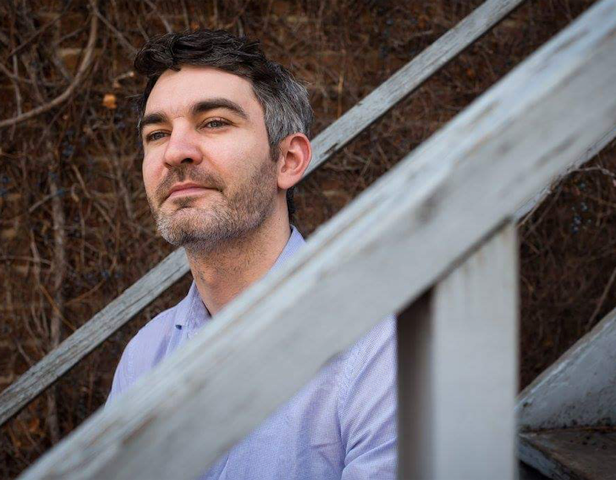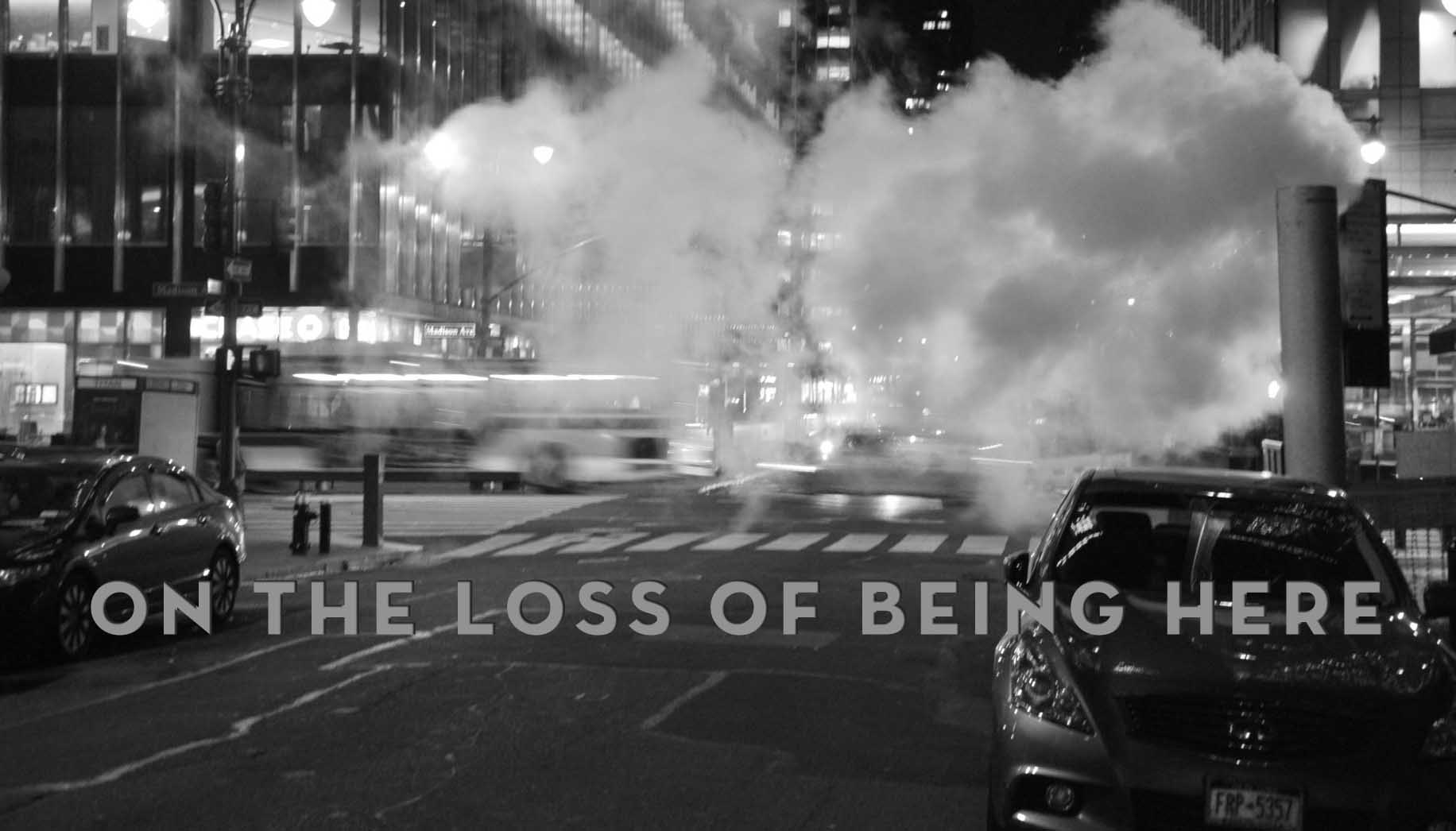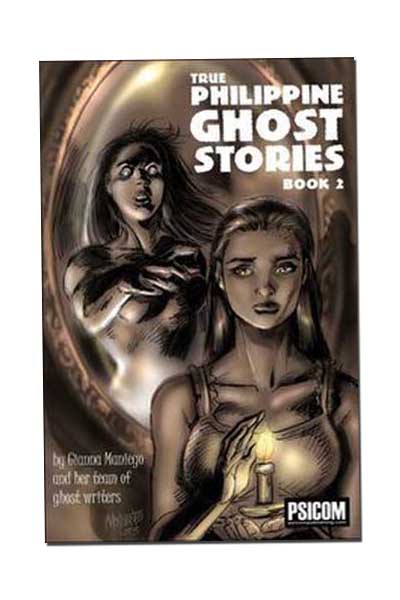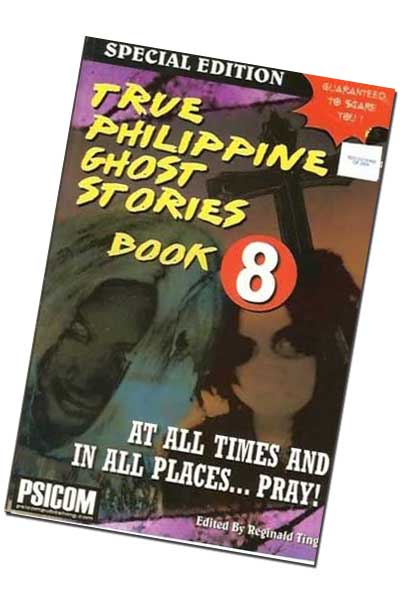Evan James
—for Kokoy Guevara
|
Dear K., I’m watching a video of you skateboarding in the Philippines, where you were born and where you died. A friend skates behind you, recording your swift downhill glide. You weave back and forth over the long road’s dividing line. You died after skating like this, struck by a motorcycle. Nearly three years have passed. So why write now, you might ask. I might ask you the same: what do you want from me? It’s summer here, a time when the invisible world draws closer to the living, burning one, when the heat smothers me like the hot breath of some emissary from the underworld. This interview with death drags on, and the days are long; I turn in abandonment to ice cream, to perfectly formed entertainments, to love, the unknown. I perish next to a box fan. rafts of music approaching the mindless Peace and stillness elude me, K. Can you tell me why? They’re like twin girls skipping away from me, laughing as they disappear down a dirt road. Everything is changing, and I dread facing myself alone. I’ll succumb to anything that keeps me floating, cinders on the air. ♦ May I quote you a few lines from Douglas Harding’s On Having No Head: Zen and the Rediscovery of the Obvious? Harding was an Englishman, a spiritual seeker born in Suffolk County five years before the World War I broke out. He died ten years ago, near Ipswich. That’s almost as long as a human life can be. He once wrote about discovering, while out walking in the Himalayas, that he had no head. “This is not a literary gambit, a witticism designed to arouse interest at any cost,” he wrote. And then he wrote: What actually happened was something absurdly simple and unspectacular: I stopped thinking. A peculiar quiet, an odd kind of alert limpness or numbness, came over me. Reason and imagination and all mental chatter died down. For once, words really failed me. Past and future dropped away. I forgot who and what I was, my name, manhood, animalhood, all that could be called mine. And wrote: To look was enough. And what I found was khaki trouser legs terminating downwards in a pair of brown shoes, khaki sleeves terminating sideways in a pair of pink hands, and a khaki shirtfront terminating upwards in—absolutely nothing whatever! Certainly not in a head. And wrote: It was ceasing to ignore something which (since early childhood at any rate) I had always been too busy or too clever to see. It was naked, uncritical attention to what had all along been staring me in the face—my utter facelessness. ♦ “Good to see your face, Mr. James,” you said to me. “Good to see yours.” A hearty, back-slapping hug in your mother’s living room. “I can’t thank you enough for this.” “Don’t mention it,” you said. You looked different in the Philippines: fitter, more sinewy. But then the same receding hairline, black hair swept away from either side of the part, the same stern look that could give in to good, grinning humor if the mood struck, if the joke landed. Your tone of voice changed then, goofier, a slapstick stage pronouncement that might put us both at ease over my sudden appearance in your family’s home—planned, yes, and yet no amount of planning can fully dilute the strangeness of one person traveling long distances to see another for curiosity’s sake, for the sake of friendship. “Welcome to Manila,” you said. I had been napping in your book-filled bedroom after arriving early. Your mother had arranged for a car to ferry me from Ninoy Aquino to the high-rise condo in Pasig. As we passed through Makati and then over a river, the crush of traffic—SUVs, sedans, motorcycles, trucks—entranced me, the way of things here so different from Jakarta or Phnom Penh or Hanoi, where flocks of motorbikes rule the road. “Do you have any dietary restrictions?” you asked me, cocking an eyebrow. “Do you eat tripe? I want to make sure you experience Filipino offal cooking.” Your aunt, who wrote a column for a cooking magazine, your mother, and your sister talked over one another in the living room, bubbling with ideas about what kinds of Filipino food I should eat on my first night: kare-kare, sisig. Mention of halo-halo and your aunt and mother switched from Tagalog to English to tell me about your sweet tooth. “We used to mail him boxes of his favorite candy in Iowa,” your mother said, her voice bright and triumphant. “You didn’t know?” “I eat everything,” I said. Among these cheerful women, you struck me as oddly placed for a moment: brooding, grave. I knew so little; we settle for so little knowledge of each another. “Good, I’m going to make you eat balut,” you said. We all took the elevator to the parking garage and piled into an SUV. Cars, cars: you drove us to Café Juanita, where we ordered a feast, everyone in buoyant spirits. I raised a cold San Miguel beer in a toast to you and yours. You and yours toasted me as your guest. One delectable dish after another came to the table: squid stewed in vinegar, herbs, and soy sauce; kare-kare with oxtail, tripe and various vegetables stewed in a peanut sauce with bagoóng; sisig, which you described to me as “chopped pig’s face”; and a fried whole Laguna fish, head on, accompanied by little white dishes of tomato salsa. Knowledge may fail me, but appetite? Never. In the middle of the meal, you returned to your proposed test of my American squeamishness: balut. “Yes, time for balut,” your mother said, her face all play-cruel smile. She called one of the waiters over and requested that he run down the street to a vendor, buy a balut, and bring it back to the table. “Make sure you get a good one,” she said. The waiter nodded, then walked out of the restaurant. He returned several minutes later with a duck’s egg. “Oh, shit! There it is,” you said. “You’re taking real pleasure in this, aren’t you?” You cackled as your aunt cracked the top of the egg open carefully, peeling away enough of the shell to reveal the curled up, slimy little duck embryo, its soft, beaked head resting on a yellow pillow of yolk. You Guevaras tittered while I scrutinized the balut. (Scrutiny: balutiny?) You explained that the liquid broth inside was amniotic fluid, which one was meant to slurp. And then you took photos with both your phone and mine: me holding the balut with an aggrieved look on my face; me hamming it up with the balut raised to my lips; the balut alone, ready for its close-up. (A month later, the sight of these photos gave me pause. I appeared gangly in a collared, pale linen shirt that had a curious affectation about it. Did I think I was a character in a Graham Greene novel? Good thing I’d ditched the woven hat from New Zealand that would’ve compounded the effect. I’d grown a beard while traveling, and in the photos I looked a little too wild and ragged, too thin, my face flush from booze and heat. These photos failed to reflect the figure I hoped to cut at the time: a presence soft as linen yet savvy, too, piratical yet presentable. A Traveler. Instead: eccentric, lost. In a fit of vanity and embarrassment, I weighed deleting them all, erasing each unflattering image of my face staring back at me. The fit passed, though I still feel I’d been, in some serious way, ridiculous.) You grinned and took video as I steeled myself to eat. I drank the amniotic fluid in one shot. Good—comforting even, like chicken soup. Then I took the creamy yolk and the meaty, slightly crunchy embryo into my mouth, and tried not to rush through chewing it up as you Guevaras all laughed and cried out with delight. You all even applauded. I smiled through my embarrassment. I was glad, anyway, that it brought you pleasure. “I’m proud of you,” you said, your hand on my shoulder. “I’m going to need another drink,” I said. We laughed. Warmth spread through my body. For the length of the meal, at least, I felt at home with your family. I made a mental note: wherever I ended up in the years to come, I must extend an invitation, must repay your hospitality in kind. The thought that I might get to do so one day—that this exchange of life, begun in earnest now, might continue—gave me a small thrill. ♦ May I confess to you a few things about myself? I’m frightened by the future, and by everything that’s new. I feel more lost in the world with every passing year. This though I met a man I love, and will be starting a better job as a teacher soon—a teacher of young kids, middle and high school—and will, with my new salary, finally move out of the mouse-infested shared apartment where I live and into my own place. So, you see: good things, great developments, wondrous progress, superheroes, onward the course of empire and fine dining. And yet I fear this forward motion is erasing me. The terror of annihilation strikes on the heels of well-being; my boyfriend could tell you about the times I’ve leapt out of bed in the middle of the night, suddenly shouting and sobbing, consumed and inconsolable, hysterical for an hour or more, rocking and weeping on the fine little yellow sofa at his place while he tries to comfort me, brings me whiskey. “Why are we here?” I’ll say, blubbering. “I’m serious! Why are we here?” Is it true what Montaigne, Big Daddy Essay, said about philosophy, quoting Cicero? That to study philosophy “is nothing but to prepare oneself to die”? Hey, K.: is all literature prison literature? Last month I spent three weeks traveling in the Balkans. Bulgaria, Serbia, Bosnia. The truth is that ever since I started traveling on my own—that trip to New Zealand and Southeast Asia, where I visited you—I feel increasingly less sure about everything, including myself, my name, manhood, animalhood, all that could be called mine. Remember how, in one of those enormous air-conditioned mall-palaces in Manila, you told me about your amateur boxing? You wanted to stop at a shop to pick up some new wraps. “It’s not really something I tell people about,” you said. “Not many Iowa people know, anyway. I used to do it more. My family didn’t like it. I train more discreetly now.” “Do you mean—do you really fight?” You had better friends than me in America, ones to whom this would probably come as no surprise. “Totes, brah,” you said. You threw a few punches, dancing around an invisible opponent. Within an hour you’d be behind the wheel of an SUV, stuck in traffic with me, talking about Kant or about the ghosts of fallen construction workers rumored to haunt the Manila Film Center built on the orders of Imelda Marcos. “Filipinos are obsessed with ghosts,” you’d say. In Serbia I traveled with a sixty-seven-year-old retired boxer and bartender. A former pro heavyweight, he’d fought Larry Holmes, “The Easton Assassin,” in Madison Square Garden in the 70s. I knew him through the bookstore in New York. He’d moved to Belgrade to fight a legal battle for property restitution, to reclaim the mansion his father had lived in on Krunska Street until the Communist government seized it. In one room of the otherwise empty twenty-two-room abode, which also lacked electricity and running water, Bob’s bed, wrapped in an eye-popping rose-colored sheet, abutted a shelf crammed with books. Books on the floor, books in built-in cabinets. Old photographs, frameless, of European faces gazing into old cameras and posterity—us!—as though in their finery they had paused to acknowledge the great fog before them. A half-dozen flies made weird loops around the room. A few days after coming back to New York, I woke up from a jet-lagged sleep to the startling sight of my own bedroom. For a few moments, I didn’t understand where I was—I’m sure that happened to you at least once in your life. But it wasn’t only that, K.: for those moments, which stretched on too long, I could not remember who I was. Where did I work? Where did I come from? Who did I love? And I swear to you that, although I saw my body lying before me, naked arms terminating in a pair of tanned hands, hairy legs in a pair of pink and tired feet, I could not for the life of me picture my own face. In that moment, a void. It wasn’t until I jumped up to piss that it all came rushing back, set out hastily as though by a host who’d forgotten what time the guests were coming. ♦ “Filipinos are obsessed with ghosts,” you said. I’d asked about a roadside shrine of some kind, a small and colorful piece of ceremonial architecture made by hand. Had someone been hit by a car there? Someone’s loved one? Ghosts preoccupied me during the whole trip: my friend in Jakarta, a journalist, sent me articles about Indonesians’ “weakness for ghosts” before my visit there; in Hong Kong—next stop after seeing you—I took a self-guided tour of sites that played a significant role during the bubonic plague epidemic that hit the city at the end of the nineteenth century, which I was led to believe had left so many ghosts behind that nobody who could afford better wanted to live in the formerly stricken neighborhoods. Driving out of Intramuros after our walking tour of that walled city led by the flamboyant Carlos Celdran, you asked me teacherish questions. (I’d visited De La Salle, where you taught, had sat in on your class. You introduced me as a guest, then proceeded with a serious lecture the subject of which now escapes me completely. Your students watched you in serious silence.) “What do you think?” you said. “What did you learn about the Philippines today?” Celdran came to mind, dressed in Spanish colonial garb as he walked us through the Fort Santiago citadel and the baroque San Agustin Church, shouting “Walk this way!” He’d led our group to vantage points where we, dutifully following, viewed evidence of the damage caused by American bombing and shelling against the occupying Imperial Japanese Army during World War II. (I bought a t-shirt from Celdran advertising his one-man show, Livin’ La Vida Imelda, about the notorious former First Lady, taken by the brightly colored image of Imelda Marcos. Within the year, however, it faded so that the face all but disappeared, leaving only white.) To you I said, groping: this mix of histories—indigenous, Spanish, American, etc., what a trip, what a lark, what a plunge! Amazing. Incredible. Fascinating. Complex. And though I knew a thing or two about America dropping bombs on the Philippines, to look, to see, to really see, here, now— “When I was a teenager, I just wanted to get out of here,” you said. “I wanted to study poetry in America. I loved American poetry. I would go to the bookstores constantly and pick up every new book of American poetry or book about American poetry I could find. Now that I’m here again, I’d like to get a teaching job back in the States.” A night in June years before: you reading a poem out to a crowd on a lawn in Iowa, face half-lit by a bonfire. I confess your language perplexed me, K., and still does, though your gravity and the revelation of your private rigor captured my attention. I’m reading something you wrote now:
I had in my remains and therefore left beyond in having already left: I laughed at it and with it I beat myself into, so again I was out of a time And again I was peopled with the city I called I swore to step off a roof I had made out of hiding
Did you know your President is waging a lawless and bloody war on drugs, that police and vigilantes kill people in the streets with impunity? Don’t get me started on what’s happening in the good old U.S. of A. “In the bookstores here there are these cheap printed anthologies of ghost stories submitted by, uh, regular Filipinos,” you said. You honked the horn of the SUV, passed a slower driver. “True paranormal cases.” In National Book Store, you tried to help me find volumes in English or with partial English translations to no avail. I bought the ones in Tagalog anyway: Haunted Hospitals, Haunted Campus, Haunted TV Shows. The idea behind the latter delighted me, as it suggested not that someone’s television was haunted, but that the TV shows themselves were. As though a ghost could appear within a rerun of Friends, a show you loved for some reason. (I never followed it religiously, though confessed at a barbecue last week, when asked to share a “weird celebrity crush,” that I had a thing for Jon Favreau circa his cameo on the episode “The One With the Ultimate Fighting Champion.” He’s sweaty in a grey tanktop and loose black workout pants in one scene, punching a heavy hanging bag.) “So complex processes can be haunted, too,” I said. A game of calling out other potential titles began: “Haunted Puberties,” “Haunted Crime Sprees,” “Haunted Friendships.” One volume intrigued me especially: Haunted Call Centers. So many American companies outsourced telephone customer service work to the Philippines that it had eclipsed India as the call center capital of the world. Given the endless hours a huge number of Filipinos spent working in call centers, it was only a matter of time before they started filling up not only with customer service calls, but with ghost tales. “A call center is a kind of crossroads,” you said. “Actually, I heard this story about a friend of a friend. She worked in a call center, and was there late one night. While riding the elevator, she said, it stopped at an unoccupied floor, and a man in full Spanish conquistador costume got on. He got off on another floor shortly after that, never having said a word. The woman was terrified.” Questions abounded about the logistics of haunting at a call center in the Philippines devoted to serving the overseas customers of American corporations. A ghostly crossroads that stretched across the Pacific—could the American spirit world and that of the Philippines intermingle, creating a kind of syncretic haunting scenario? Did hauntings manifest on the customer service calls themselves, in the form of faint whispers in colonial Spanish or Tagalog? “I saw a Cambodian ghost comedy in Phnom Penh,” I said. You turned the car down a tree-lined street, bringing us closer to the Jorge B. Vargas museum. A lesson in the history of art in the Philippines awaited me. “It was in a mall. There were no subtitles. I wanted to see how much of the story I could absorb without comprehending a word of dialogue.” “And?” you said. “It struck me how secondary language is when it comes to communicating the full force of a ghost story. The conventions of a ghost story are, I think, universal enough that I even wondered whether the imposition of language might’ve diluted the power of the film for me.” You wanted to know more, so I described the story of Preay Phnek 4 (4-Eyed Ghost) in some detail. In a village, a mother dies. Pregnant with her third child at the time, she subsequently appears at inopportune moments to haunt those left behind, acting as a kind of spectral conscience, commenting with some comic flair on the vices and flaws of the other villagers. Male and female energies clash: the men try to banish what they take to be this vengeful female spirit, but fail repeatedly, as when the local shaman tries to drive her away using a sequence of shopworn wards against evil—a wreath of garlic, a crucifix that the ghost, bored by the shaman’s efforts, simply tosses aside. Still she goes on haunting them. She sits in the branches of a tree, singing an eerie lullaby that throws the villagers into a frightened, cartoonish panic. She gives a final speech, a suddenly grave confession or rebuke—part personal shame, part disappointment in the villagers for their inability to grasp her true aim—in which, ghost baby in arms, she insists to those gathered that she never had any sinister intentions. As symbolic emissary for the awesome and terrifying force of Nature, she never meant them the harm they read into her reappearances. She wanted only to rejoin her family—her husband, her motherless children. It’s too late by then: she’ll leave them, just as they wished, for good. It’s only the living son and daughter, closer because of their youth to the mysteries of the great beyond, who react throughout the film as though her visitations are a pleasant surprise rather than cause for alarm. And it’s those two who weep most, grieve loudest, when their ghost mother fades from view, vanishing forever to their tearful cries of mai, mai. Where did she go, K.? “That’s crazy, bro,” you said. You shared some popular ghost myths and some urban ghost legends of the Philippines then: the folkloric Manananggal, a kind of flying vampire who splits her body in half and preys on sleeping pregnant women, using her elongated tongues to suck out the hearts of fetuses; the White Lady of Balete Drive in nearby Quezon City, who died in a car accident and now catches rides from graveyard shift cabbies or appears suddenly in the rearview mirrors of solitary drivers. “And then, of course, there are the headless priests. People in the Philippines are always seeing headless ghosts. And a lot of priests for whatever reason—priests, monks, and nuns. I guess it’s upsetting to a Christian people that a holy person might be killed before their time. So, like, there are hotels that used to be seminaries, but were converted after the war. But during the war, priests who tried to take refuge from the Japanese there were killed, and sometimes beheaded. Now you’ll hear about these ghosts all over the place: roaming the corridors of hotels at night, appearing on the side of the road, wandering school campuses and parks…” “Call centers?” I asked. “Yeah, maybe call centers,” you said. “They say the chapel at De La Salle is haunted by the victims of a mass killing from World War II. Apparently you can sometimes hear people screaming there on a rainy night, or see a headless priest. According to rumor.” “Shut up,” I said. “Have you noticed anything?” “I don’t go to the chapel, really,” you said. “I’ve definitely never been there at night.” “We should go.” Volumes of ghost stories shifted in the plastic shopping bag at my feet as you guided the car through a curve. My idea amused you, though in the end it joined one of a dozen passing notions you or I had about what we should do while I was in Manila, notions dropped in favor of less effortful pleasures—watching Brillante Mendoza films or X-Men: First Class, drinking in karaoke bars, hanging out with acquaintances of yours at Jollibee, where you tried to convince me that the chain made its burgers out of earthworms. “Cheaper,” you said. What if we’d driven on a rainy night to De La Salle—named for the patron saint of teachers—and crept into the chapel? Picture us there in that dark, silent place, Chapel of the Most Blessed Sacrament, sitting in pews on opposite sides of the aisle. Unlit chandeliers hang in a row over our heads. The rain beats down on the building outside; we wait for the ghosts of war. Picture us giddy, like young kids—truly frightened, too. My heart pounds now to think of the heart pounding, pounding because of something sensed, something felt: a flutter of motion in the corner of my eye. Could those be the screams of the murdered, faint inside the hissing rain? A figure in the chancel drifts before us then, crossing the raised level like an actor on a stage. “Holy shit, dude,” you say. You say my name. “Do you see that?” Its hands grope the altar, feeling for what’s lost. Its headless body, draped in pale vestments, collared with a white clerical band, turns this way, now that. Before we know what to do, it’s gone—gone somehow, though we never saw it vanish. We rise and we run, children afraid, thrilled to be afraid, saying in hot, astounded whispers, “Go-go-go-go-go!” We rush from the chapel and into the hall, laughing and panting, taking the Lord’s name in so much vain, so many times, down the stairs, towards the doors. Who could believe our luck in seeing the headless, restless dead, K.? Who could feel more alive than we do as we rush, rush from that haunted campus, out of a memory, a fantasy, a wish? ♦ Yesterday morning, before heading to work at the bookstore, I watched the original adaptation of Stephen King’s Carrie, part of a daylong marathon of horror playing on IFC. My boyfriend left in the middle of the climactic scene—all that blood, all that fire—to go box for an hour with his personal trainer. I kept watching on my own. I’d forgotten Sissy Spacek’s face during that microcosmic prom apocalypse: covered in sticky pig’s blood, she’s no longer aware of herself at all. She becomes all sight—a sight so pure, a focus so intense that it gathers to a laser point of potent telekinesis. Do you remember learning about telekinesis when you were young? I came upon it for the first time in the Roald Dahl book Matilda. To think: one might move things with ones mind! I remember going home after school that day and sitting at the kitchen table by myself. I wanted to see if I too had the gift, and so I laid a blank piece of college-ruled paper out on the surface before me. Little me in a Gotcha sweater, years from meeting or losing any lasting friends, frightened then as I am now. The white rectangle fills my vision: the blue horizontal lines, the fainter pink one going vertical, the three holes like voids punched down the side, its utter facelessness. “It was a vast emptiness vastly filled, a nothing that found room for everything,” says Douglas Harding of that “hole where a head should have been.” Tell me, K.: what happens if, forgetting myself completely, I become the paper, and I slide across the table, fall off, drift to the floor like a leaf? Yours, E.
|
|
______
 Evan James’s work has appeared in Oxford American, The Iowa Review, Travel + Leisure, The Sun, The New York Observer, and elsewhere. He attended the Iowa Writers’ Workshop, and in 2017 he was a Fellow at the Sozopol Literary Seminars in Bulgaria. His novel Cheer Up, Mr. Widdicombe and a collection of essays will be published by Atria Books in 2019. He lives in New York.
Evan James’s work has appeared in Oxford American, The Iowa Review, Travel + Leisure, The Sun, The New York Observer, and elsewhere. He attended the Iowa Writers’ Workshop, and in 2017 he was a Fellow at the Sozopol Literary Seminars in Bulgaria. His novel Cheer Up, Mr. Widdicombe and a collection of essays will be published by Atria Books in 2019. He lives in New York.






